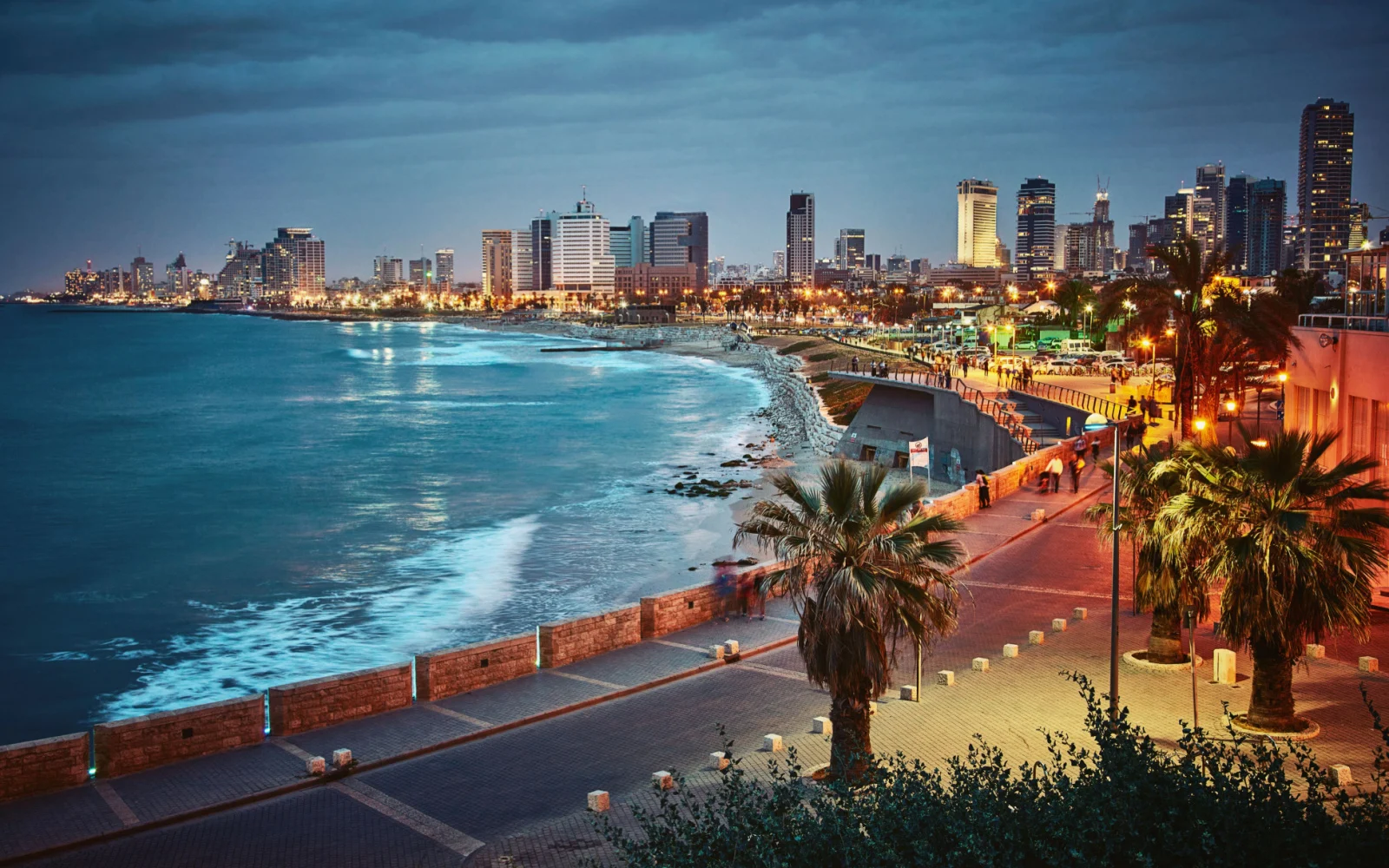What's the best time to visit Tel Aviv?
The best time to visit Tel Aviv is in the summer, from June to August, when the weather is perfect for swimming and the city buzzes with energy. With temperatures typically between 77°F to 90°F, it’s ideal for beach outings, outdoor events, and lively nightlife. Despite higher accommodation costs, summer in Tel Aviv offers a vibrant experience of festivals, markets, and a dynamic Mediterranean lifestyle.
Founded in 1909 as a Jewish garden suburb, Tel Aviv has evolved into a culturally impactful city. It’s one of those cities that leaves an ever-lasting impression on visitors, and you simply can’t go without reliving that experience more than once.
But when exactly is the best time to visit Tel Aviv, be it for your long-awaited return or as a first-time visitor? We’ll show you this and more below.
The Overall Best Time to Visit Tel Aviv
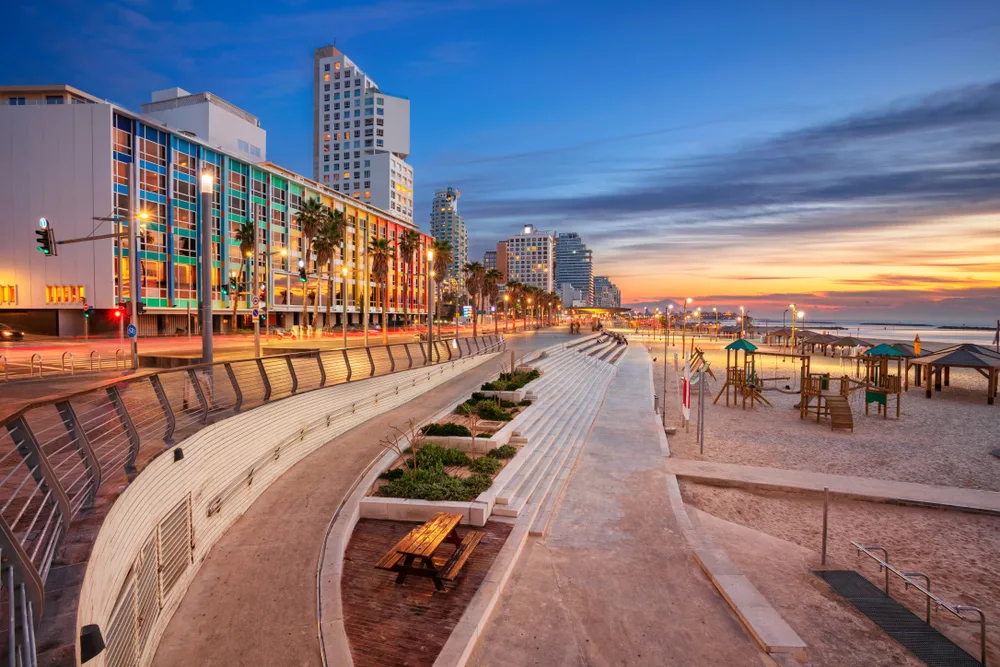
Rudy Balasko/Shutterstock
The best time to visit Tel Aviv is in the summer (June–August). The Mediterranean is ideal for a swim, as the water temperature is perfect and the skies are clear.
This peak season is when the city is at its most lively, offering a perfect atmosphere for those eager to dive into its dynamic culture. In summer, Tel Aviv boasts long, sun-drenched days with temperatures usually ranging from 77°F to 90°F (25°C to 32°C).
These warm conditions are ideal for enjoying the city’s beautiful beaches, going to outdoor concerts, and experiencing the nightlife. However, summer’s popularity means increased tourist numbers and consequently, higher hotel rates.
During this season, you can expect to pay around $250 to $300 per night for standard accommodation, significantly more than in other months.
Despite the higher costs, summer in Tel Aviv provides an experience filled with various festivals, bustling outdoor markets, and an active beach scene, all epitomizing the city’s famous Mediterranean lifestyle.
The season’s warmth is not limited to the weather but is also reflected in the vibrant outdoor dining, energetic nightlife, and the overall lively pulse of the city. For those looking to experience Tel Aviv in all its glory, summer stands out as the best time to visit.
Cheapest Time to Visit Tel Aviv
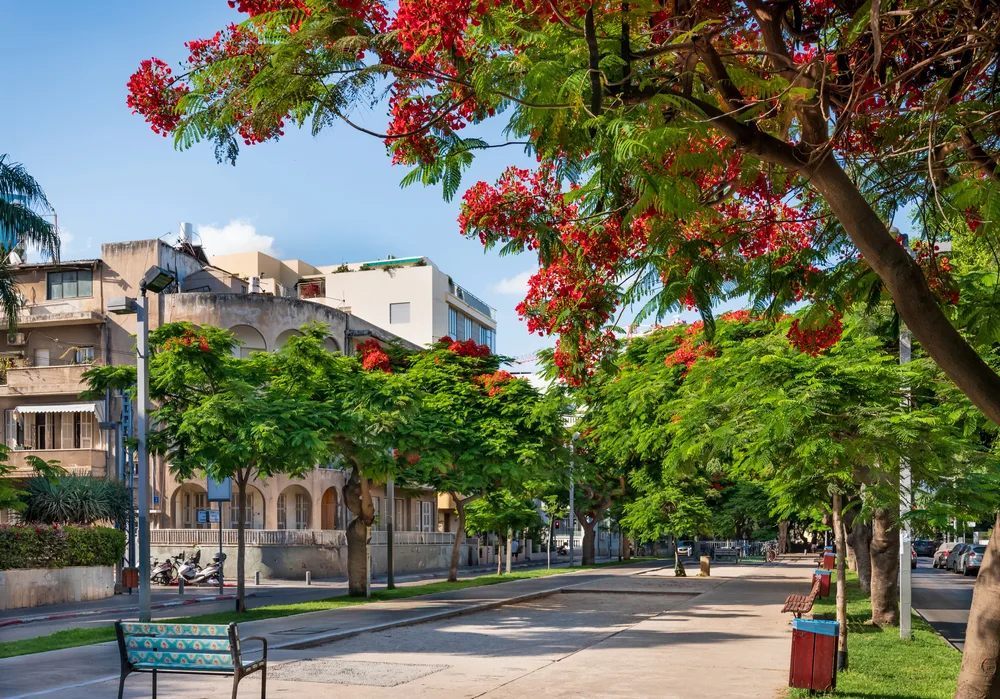
Boris-B/Shutterstock
The cheapest time to visit Tel Aviv is in the late fall or early spring. These shoulder seasons, extending from November to early December and then from March to April, offer a sweet spot for budget-conscious travelers.
During these periods, the city experiences a significant drop in tourist numbers, leading to more competitive hotel rates. On average, travelers can expect to find accommodation prices about 20-30% lower than during peak summer months.
For instance, a standard hotel room that might cost around $200 per night in the busy summer season can be found for approximately $140 to $160 per night in these quieter months.
Apart from savings on accommodations, visitors during these times also benefit from lower airfare and less crowded attractions. The weather remains pleasant, typically ranging from 59°F to 68°F (15°C to 20°C), ideal for exploring Tel Aviv’s diverse cultural offerings and outdoor activities.
It’s also worth noting that dining out and shopping can be slightly less expensive during these months, as some businesses offer off-season discounts.
Least Busy Time to Visit Tel Aviv
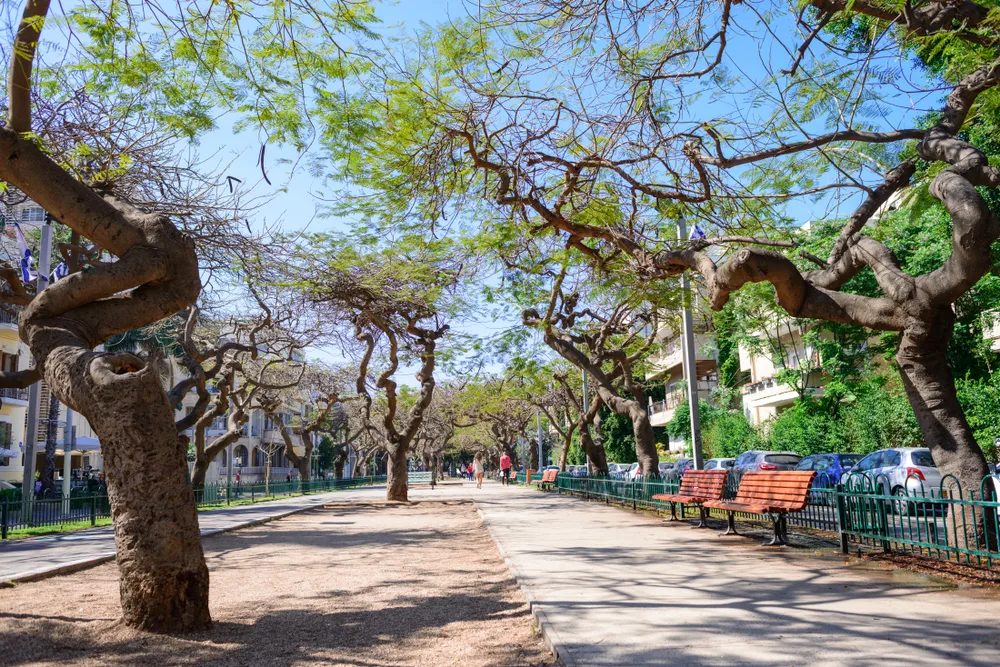
Stanislav Samoylik/Shutterstock
The least busy time to visit Tel Aviv is either in spring (March–May) or in September and October. Those who wish to avoid the hectic crowds or long queues will find these shoulder months satisfactory.
Spring is a great time to be in Tel Aviv. Temperatures increase after a chilly winter period, and the city enjoys moderate crowds.
If you visit in March, make time for Purim (although the dates vary each day). A popular Jewish festival, Purim is all about masquerading, having a good time, partying, having a drink, and letting yourself get loose.
April hosts Fresh Paint, an art and design fair to add a bit of an aesthetic vibe to your Israeli itinerary. This month also marks Israel’s Independence Day (Yom Ha’atzmaut) with both formal and informal festivities and celebrations.
May has another significant celebration — Shavuot, a Jewish holiday. Observe the day by either joining a loud evening feast or observing a costume parade.
These months have average temperatures between highs of 76°F and lows of 52°F. Visiting in fall means you don’t have to fight your way to major attractions, keep up with the summer tourists, or book in advance to get okay prices.
Take note of the Jewish High Holy Days of Rosh Hashanah and Yom Kippur, which take place in September/October (varies from year to year), and Rosh HaShanah, the Jewish New Year.
Probably the holiest day in the entire year, Yom Kippur is celebrated with full fasting, prayer, sin confessions, and ascetic behavior. In October, there’s the Tel Aviv Night Run — you can take part or just cheer on participants.
Mark your calendars for October’s Sukkot celebration, honoring the 40 years Jewish people spent in the desert heading toward the Promised Land. Average fall temperatures fluctuate between a high of 84°F and a low of 58°F.
Worst Time to Visit Tel Aviv
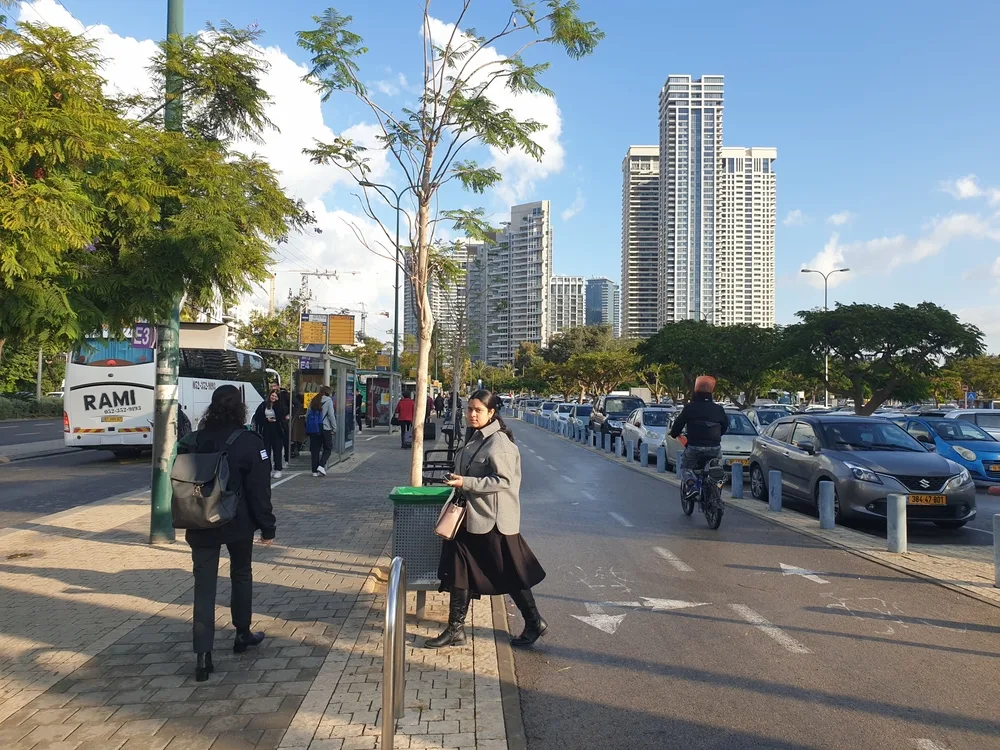
TEL AVI, ISRAEL. December 27, 2022. Bicycle track by the 2000 Savidor bus terminal in central Tel Aviv. Israel public transportation editorial illustrative/Roman Yanushevsky/Shutterstock
Although a year-round destination, the worst time to head to Tel Aviv is probably during the winter months (December–February).
That said, the temperatures are still fairly enjoyable, with highs of 66°F and lows of 49°F. Swimming, however, is not a good idea. It may be possible, but as rain is quite frequent, nothing quite lives up to Tel Aviv’s spring and summer sun and transparent skies.
If going to the beach isn’t that important to you, chances are you won’t perceive winter as the worst time to visit Tel Aviv. However, we believe that hitting the beach is a key Tel Aviv experience, one without which you can’t fully experience the city.
On another note, thanks to the slight spike in tourists, prices may increase in winter, especially during the holiday season — yet another reason why you should avoid going to Tel Aviv in winter.
That said, Christmas is said to be a magical time in Tel Aviv — the best way to celebrate it is by heading to Bethlehem, with Hanukkah overlapping most of the time or occurring just before.
It’s one of those holidays that will acquaint you with the Jewish way of doing festivities and make you understand their culture. New Year celebrations include a myriad of entertaining parties (note that January 1st isn’t a national holiday, though).
The Tel Aviv Jazz Festival happens in February, one of the best jazz events in the country. If you’re into running, sign up for the yearly Tel Aviv Samsung Marathon in February and compete with fellow runners.
So, What’s the Best Time to Visit Tel Aviv?

TEL AVIV, ISRAEL – AUGUST 21, 2020 : Tel-Aviv beach at Marina Tel Aviv area. Israel/Boris-B/Shutterstock
The best time to visit Tel Aviv is in the summer (June–August). With its pleasant weather, sunny days, busy beaches, and a myriad of cool events, you’re bound to have a memorable stay. Get ready for peak-season prices, though.
That said, it’s also a special time to be in the country, considering the plethora of festivities and local celebrations, drawing in both locals and visitors.
All in all, Tel Aviv is one of those majestic cities you can head to at any time of the year and have an awesome stay. Plus, following our travel tips and suggestions will further ensure that your Tel Aviv adventure is one to remember!



